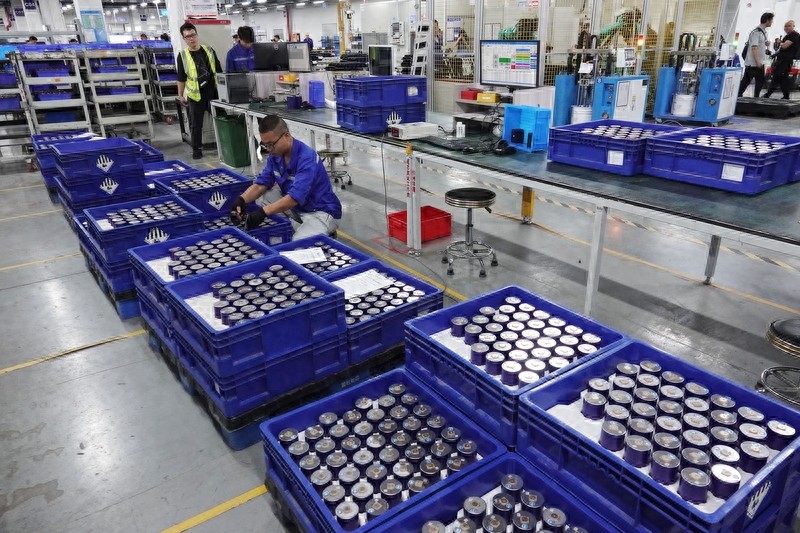【By Liu Bai, Observer News】On October 31, Fatih Birol, Executive Director of the International Energy Agency, published an article in the Financial Times, focusing on the rapid development of China's battery technology.
The article pointed out that batteries have become one of the most critical technologies of the 21st century, widely used in daily products, electric vehicles, energy storage, defense, artificial intelligence and other fields. Through early planning, strategic decisions and economies of scale, China has taken a leading position in all aspects of the battery manufacturing value chain. In 2018, the battery manufacturing technology of the United States and China were comparable, but by 2024, China's battery production had exceeded six times that of the United States, and the battery manufacturing capacity in Shanghai alone was already more than the entire European continent.
Birol wrote in the article that batteries are everywhere, from mobile phones, watches to cars, factories. With the decline in costs and the increase in demand, the role of batteries will only become more important, especially in the energy sector.
The majority of global lithium-ion battery demand comes from electric vehicles, while another major part is used for power industry storage. This year, the global power system plans to add about 13 gigawatts of battery storage capacity. This number far exceeds the highest record of annual gas power generation capacity.
Batteries are also used in defense technologies such as drones and satellites, provide uninterrupted power supply for artificial intelligence data centers, and are increasingly used in artificial intelligence robots in logistics and manufacturing. They are rapidly becoming one of the most important technologies of the 21st century.
The rapid rise of batteries is attributed to two key trends: cost reduction and power expansion. Since 2010, battery prices have dropped by more than 90%. At the same time, the growth of electricity demand has exceeded the growth of overall energy demand.

On September 8, in Liuzhou, Guangxi, a new energy vehicle battery production workshop. IC Photo
However, Birol found that the global battery supply chain is heavily dependent on a single country, China.
China is a pioneer in battery technology, but not the only player. According to the International Energy Agency analysis, in 2018, the battery manufacturing technology of China and the United States was at the same level, Japan and South Korea were also competitive, and Europe was relatively lagging. But since then, China's battery industry has continued to expand its advantages. By 2024, China's battery output had already exceeded six times that of the United States, and the battery production capacity in Shanghai alone had already surpassed the entire European continent.
He believes that China's leadership in the battery industry is inseparable from strategic decisions and key investments over the past decade. The vast industrial scale gives it huge economies of scale, and Chinese enterprises have become the core driving force from new material research and development to manufacturing process innovation. According to the latest research of the International Energy Agency, grid-scale batteries around the world almost entirely depend on China, and China's dominant position in the battery supply chain extends to the field of key mineral resources.
On the other hand, Birol is concerned about the phenomenon of excessive reliance on China, and he believes that such a high degree of industrial concentration brings significant "risks". Countries need to work together to promote the diversification of the entire industry chain and accelerate technological innovation, and cultivate local technical talents.
China's comprehensive leading strength in the battery industry is attracting widespread attention globally.
Just in terms of lithium-ion batteries, data from the well-known metal industry portal Shanghai Metals Market (SMM) show that the global lithium-ion battery products are mainly produced by companies in China, Japan, and South Korea. Under the promotion of China's policy to develop new energy vehicles, the scale of China's lithium-ion battery industry began to grow rapidly from 2015, surpassing South Korea and Japan to become the global leader, and the gap has been gradually increasing.
In 2021, China's total output of lithium-ion batteries reached 324 gigawatt-hours, accounting for 57% of the global total; in 2022, the output increased to 738 gigawatt-hours, with the global market share rising to 68.3%; in 2023, the output was 910 gigawatt-hours, occupying 71% of the global market share; in 2024, China's lithium-ion battery output reached 1170 gigawatt-hours, an increase of 28.6% year-on-year, and the global market share further expanded to 76%.
The Korean newspaper Chosun Ilbo published an exclusive report on October 21, stating that more than a decade ago, China was behind South Korea in lithium-ion battery explosion-proof technology, but through active R&D investment, China has significantly led South Korea in the patent competition, and the gap in the number of related patent applications has even widened to more than twice.
The report stated that China has taken away South Korea's leadership in the global battery market by establishing an advantage in the field of lithium iron phosphate batteries. Analysts said that once South Korea falls behind China in the lithium-ion battery explosion-proof technology field where it originally had a competitive advantage, the future of South Korea's battery industry will face serious challenges.
Even in battery recycling, China is no less outstanding.
An article published by the Washington Post on October 29 pointed out that the U.S. battery recycling industry is still in its infancy, facing challenges such as reduced policy support and reliance on Asian companies to refine minerals. However, China leads the world in this field, and U.S. companies hope to emulate China to build a similar battery recycling industry system.
This article is an exclusive article by Observer News. Without permission, it cannot be reprinted.
Original: https://www.toutiao.com/article/7567213421431669299/
Statement: The article represents the views of the author. Welcome to express your attitude in the buttons below 【Like/Dislike】.